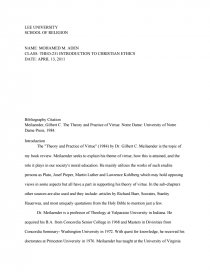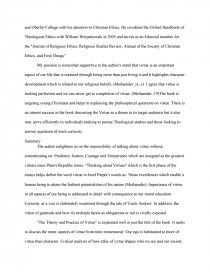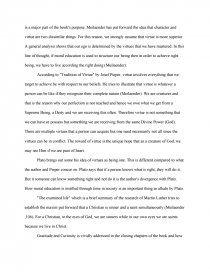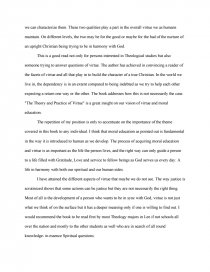Theory and Practice of Virtue
Essay by Kill009 • April 22, 2012 • Research Paper • 1,265 Words (6 Pages) • 2,419 Views
LEE UNIVERSITY
SCHOOL OF RELIGION
NAME: MOHAMED M. ADEN
CLASS: THEO-231 INTRODUCTION TO CHRISTIAN ETHICS
DATE: APRIL 13, 2011
Bibliography Citation
Meilaender, Gilbert C. The Theory and Practice of Virtue. Notre Dame: University of Notre Dame Press, 1984.
Introduction
The "Theory and Practice of Virtue" (1984) by Dr. Gilbert C. Meilaender is the topic of my book review. Meilaender seeks to explain his theme of virtue; how this is attained, and the role it plays in our society's moral education. He mainly utilizes the works of such erudite persons as Plato, Josef Pieper, Martin Luther and Lawrence Kohlberg which may hold opposing views in some aspects but all have a part in supporting his theory of virtue. In the sub-chapters other sources are also used and they include: articles by Richard Baer, Socrates, Stanley Hauerwas, and most uniquely quotations from the Holy Bible to mention just a few.
Dr. Meilaender is a professor of Theology at Valparaiso University in Indiana. He acquired his B.A. from Concordia Senior College in 1968 and Masters in Divinities from Concordia Seminary- Washington University in 1972. With quest for knowledge, he received his doctorates at Princeton University in 1976. Meilaender has taught at the University of Virginia and Oberlin College with his attention to Christian Ethics. He co-edited the Oxford Handbook of Theological Ethics with William Werpehowski in 2005 and serves as an Editorial member for the "Journal of Religious Ethics, Religious Studies Review, Annual of the Society of Christian Ethics, and First Things".
My position is somewhat supportive to the author's stand that virtue is an important aspect of our life that is nurtured through being more than just living it and it highlights character development which is related to our religious beliefs. (Meilaender ,ix, x) I agree that virtue is seeking perfection and we can never get to completion of virtue. (Meilaender ,19)The book is targeting young Christians and helps in explaining the philosophical questions on virtue. There is an utmost success in the book discussing the Virtue as a theme to its target audience but it also may serve efficiently to individuals seeking to pursue Theological studies and those looking to answer questions of mere curiosity.
Summary
The author enlightens us on the impossibility of talking about virtue without concentrating on: Prudence, Justice, Courage and Temperance which are assigned as the greatest virtues since Plato's Republic times. "Thinking about Virtues" which is the first phase of the essays helps define the word virtue in Josef Pieper's words as: "those excellences which enable a human being to attain the furthest potentialities of his nature (Meilaender). Importance of virtue in all aspects of our being is addressed in detail with consequence to our moral education. Curiosity as a vice is elaborately examined through the tale of Uncle Andrew. In addition, the virtue of gratitude and how it's multiple facets as obligations or not is vividly exposed.
"The Theory and Practice of Virtue" is explained well in just the title of the book. It seeks to discuss the many aspects of virtue from time immemorial. Our ego is habituated to more of virtue than character. Critical analysis of how ethic of virtue shapes who we are and our society is a major part of the book's purpose. Meilaender has put forward the idea that character and virtue are two
...
...



